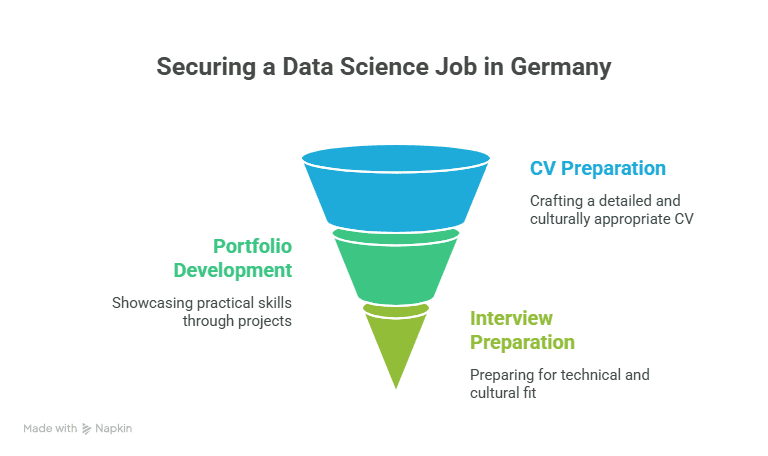Data science jobs in Germany have become one of the most sought-after career opportunities in Europe’s largest economy. With the country’s digital transformation accelerating across industries, demand for skilled data professionals has reached unprecedented levels. Germany provides high salaries, work-life balance and many openings to the fresh graduates and experienced professionals who want to grow their career in this fast-moving industry. For anyone considering a move, data science jobs in Germany represent a gateway to a thriving tech ecosystem.
Understanding the Data Science Job Market in Germany in 2025
- The impact of the German data science job market has grown tremendously, whereby job adverts have increased by more than 200 per cent over the past years. This explosive demand reflects the country’s commitment to becoming a global leader in artificial intelligence and data-driven innovation. Companies across all sectors are recognising the critical importance of data analytics in maintaining competitive advantages and driving business growth, resulting in a dramatic rise in data science jobs in Germany.
- Germany’s position as Europe’s economic powerhouse has created a fertile ground for data science jobs in Germany. The country’s strong industrial base, combined with its thriving startup ecosystem, provides diverse pathways for data professionals to build successful careers. Germany has also become one of the main tech hubs, such as Berlin, Munich, Hamburg, and Frankfurt, which have become the centres of excellence concerning these job positions.
- There is a high demand on the market to find specialists in the sphere of machine learning, artificial intelligence, and big data. German firms have been waking up and demanding the services of experts who can find a way to intersect the complicated technical solutions with practical business implementations. This trend has created numerous opportunities for both entry-level positions and senior roles in data science jobs in Germany across various industries.
Why Germany is a Top Destination for Data Science Careers in 2025?
- Germany stands out as an exceptional destination for data science jobs in Germany for several compelling reasons. The country’s robust economy, ranked as the fourth largest globally, provides stability and growth opportunities that are difficult to match elsewhere. German firms are persistent in investing in advanced technologies and research, which makes it possible to conduct innovative projects with practical applications and allows data scientists to work in such an environment.
- The German government has invested heavily in data science research infrastructure and learning. The National Research Data Infrastructure (NFDI) initiative demonstrates the country’s commitment to advancing data science capabilities. This government backing translates into increased funding for research projects, university programs, and industry partnerships that benefit those seeking data science jobs in Germany.
- Another reason that makes this job in Germany very attractive is the work-life balance in Germany. The country’s strong labour laws ensure reasonable working hours, generous vacation time, and comprehensive healthcare benefits. Remote and hybrid working have become popular with many German companies, especially in the technological industry, offering flexibility that contributes to a better life.
| Advantage | Details |
| Economic Stability | Fourth-largest economy globally with consistent growth |
| Government Support | National Research Data Infrastructure (NFDI) investment |
| Work-Life Balance | Strong labour laws, 20+ vacation days, flexible work arrangements |
| Innovation Focus | High R&D spending, cutting-edge technology adoption |
| Career Growth | Diverse industries, vibrant startup ecosystem, presence of multinational companies |
Key Industries Hiring Data Scientists in Germany in 2025
- The demand for data science jobs in Germany spans across multiple industries, each offering unique opportunities and challenges. The automotive industry drives this change, as such organisations as BMW, Mercedes-Benz, and Volkswagen are the first to implement the use of AI in autonomous vehicles and intelligent production. Data scientists in these companies are actively seeking to work on areas of predictive maintenance, supply chain performance, and customer analytics, so that this job position in Germany in the automobile industry is particularly appealing.
- Financial services represent another major hiring sector for data science jobs in Germany. Data scientists are needed to detect fraud and assess risks, as well as to trade algorithms in Deutsche Bank, Commerzbank, and many financial technology startups. The industry also provides competitive wages, as well as the possibility to operate with large financial data, which adds to the value of this position in Germany.
- The healthcare and pharmaceutical sectors are recording a swift increase in the use of data science. Firms such as Siemens Healthineers and Bayer are trying to design AI-based medical diagnostic and drug discovery solutions. This sector provides opportunities to work on meaningful projects that directly impact human health and well-being, making data science jobs in Germany in healthcare highly rewarding.
- The German economy is also a manufacturing powerhouse, and including Bosch and Siemens, the companies are active in terms of digital transformation. Data scientists in this sector work on Industry 4.0 applications, including predictive maintenance, quality control, and supply chain optimisation, all of which are key drivers for data science jobs in Germany.
Types of Data Science Jobs in Germany in 2025
- This German landscape job has different types of roles to support multiple levels of skills and career expectations. Learning more about these different positions can assist job seekers in finding out which is the most appropriate to their background and objectives. Each role type comes with specific responsibilities, required skills, and career progression opportunities, making data science jobs in Germany accessible to a wide range of professionals.
- Most data science teams are built around data analyst roles. They are specialists in deriving information from the existing data to develop reports and aid business decision-making. In Germany, raw data is converted to usable information using SQL, Excel, and visualisation software such as Tableau or Power BI, and the analysis is very central to these tasks.
- Machine learning engineers represent a more specialised track within data science jobs in Germany. These practitioners formulate, build and roll out machine learning models in production. They must possess high-level knowledge of Python or R programming languages, understand cloud platforms and MLOps.
- Business intelligence developers are the bridge to the gap between the technical part of the data processing and business needs. They develop dashboards, automatic reports and data warehouses through which organisations track key performance indicators and make data-driven decisions. Such functions are part of the prosperity of this job in Germany.
| Data Science Role | Average Salary Range (€) | Key Skills Required | Experience Level |
| Data Analyst | 45,000 – 65,000 | SQL, Excel, Tableau, Statistics | Entry to Mid-level |
| Data Scientist | 55,000 – 85,000 | Python/R, ML, Statistics, Domain Knowledge | Mid to Senior |
| ML Engineer | 65,000 – 95,000 | Python, MLOps, Cloud Platforms, DevOps | Mid to Senior |
| Data Engineer | 60,000 – 90,000 | SQL, ETL, Big Data Tools, Cloud | Mid to Senior |
| BI Developer | 50,000 – 75,000 | SQL, BI Tools, Data Warehousing | Entry to Mid-level |
Entry-Level & Freshers: Data Science Jobs in Germany for Freshers in 2025
- Data science jobs in Germany for freshers represent an excellent entry point into this dynamic field. The German companies are also very active in recruiting fresh graduates and training them extensively to help in their development. Many organisations offer working student positions, internships, and graduate trainee programs specifically designed for newcomers to data science jobs in Germany.
- The basic job offers are usually associated with data analysis, report creation and assisting his or her seniors with current projects. New graduates will have the opportunity to collaborate with existing datasets, be trained within industry-standard tools, and over time assume more sophisticated tasks of analytics. The vacancies of data science professionals in Germany are easily accessible by companies such as SAP, Siemens, and many startups, and they present well-structured onboarding programs.
- In the biggest tech hubs, data science internship opportunities are the most numerous. Such jobs give a chance to work on actual business issues, but leave students time to study. Many internships lead to full-time offers, making them valuable stepping stones for a career in data science jobs in Germany.
- The salary range for data science jobs in Germany for freshers typically starts at €40,000-€50,000 annually, with rapid progression potential based on performance and skill development. Further supplementary benefits associated with this job in Germany are that there are quite a number of companies also offering training budgets, attending conferences, and mentorship programs, which also seem to make this job very attractive in Germany.
- Colleges in Germany have increased their programmes in data science education to fulfil the demands of the industry. Technical universities in Munich, Berlin, and other major cities offer specialised master’s programs in data science, creating a steady pipeline of qualified graduates for data science jobs in Germany.
Senior & Specialised Data Science Roles
- Top data science jobs in Germany are well-paid, and they offer high career growth. These jobs entail an experience of 5+ years and extensive knowledge in certain areas or technologies. Senior data scientists often lead project teams, mentor junior staff, and drive strategic data initiatives within their organisations, making them vital to the landscape of data science jobs in Germany.
- There is especially high demand in the specialised positions of AI research scientist, computer vision engineer, and natural language processing specialist. The requirements of these jobs are usually an advanced degree and published research experience. Companies like BMW’s AI research division and various Max Planck Institutes offer opportunities for cutting-edge research combined with practical applications, further expanding the scope of this job in Germany.
- When it comes to data science management jobs, they are the logical next stage of the career of many professionals. These positions are involved in the presence of technical skills and leadership responsibilities to include: team building, project management and strategic planning. The upper tier of management has a salary that can go up to 120,000 Euros a year, and this makes the job in Germany very lucrative at the higher level, especially in big tech companies and in financial institutions.
| Role | Salary Range | Key Requirements | Growth Potential |
| Senior Data Scientist | €80,000 – €120,000 | 5+ years, domain expertise, leadership | Team Lead, Principal Scientist |
| AI Research Scientist | €90,000 – €140,000 | PhD, publications, cutting-edge research | Research Director, CTO |
| Data Science Manager | €100,000 – €150,000 | Management experience, strategic thinking | VP Data, Chief Data Officer |
| Principal Data Scientist | €110,000 – €160,000 | 8+ years, thought leadership, innovation | Distinguished Engineer, VP |
Salary Trends and Benefits for Data Science Jobs in Germany in 2025
- Salary expectations for data science jobs in Germany have continued to rise, reflecting the strong demand for skilled professionals. The mean salaries stand between 50 and 95,000 Euros per year, the compensation packages are much higher during senior positions and specialised jobs. These figures represent base salaries and don’t include additional benefits such as bonuses, stock options, and comprehensive benefit packages, making this job in Germany even more attractive.
- One of the most considerable influences on the level of compensation in Germany is geographic location. The density of startup opportunities in Berlin is the highest, although the startups, on average, offer low base salaries when compared to Munich or Frankfurt. However, Berlin’s lower cost of living often results in comparable purchasing power. Munich, home to major corporations like BMW and Siemens, offers the highest average salaries but also has the highest living costs, which is an important consideration for those seeking data science jobs in Germany.
- The German benefits package for data science experts is much more than base pay. Most positions include comprehensive health insurance, generous vacation allowances (typically 25-30 days annually), and professional development budgets. Many companies also offer flexible working arrangements, including remote work options and sabbatical programs, making data science jobs in Germany highly desirable.
- The use of data science visa Germany sponsorship has gained popularity, and most companies are on the prowl to hire foreign talent. The EU Blue Card scheme gives a very appealing route to skilled individuals to be able to work in the EU. It has a quicker way of getting residency and family reunification. Companies often provide relocation assistance, including temporary accommodation and bureaucratic support for visa applications, further simplifying the process for those pursuing data science jobs in Germany.
| City | Avg. Data Scientist Salary | Cost of Living Index | Job Opportunities | Quality of Life |
| Munich | €75,000 – €95,000 | High (120) | Excellent | Excellent |
| Berlin | €65,000 – €80,000 | Medium (100) | Excellent | Very Good |
| Frankfurt | €70,000 – €90,000 | High (115) | Very Good | Good |
| Hamburg | €65,000 – €85,000 | Medium (105) | Good | Very Good |
| Stuttgart | €70,000 – €88,000 | Medium (110) | Very Good | Good |
Skills & Qualifications Needed for Data Science Jobs in Germany in 2025
- Success in data science jobs in Germany requires a combination of technical expertise, analytical thinking, and business acumen. The German employers especially appreciate potential employees who can prove that they are able to perform their work practically and that they have relevant portfolio projects and experience in real life. The skill requirements vary depending on the specific role and industry, but certain core competencies remain consistent across most data science jobs in Germany.
- Educational background plays a crucial role in data science jobs in Germany. Most positions require at least a bachelor’s degree in a quantitative field such as computer science, mathematics, statistics, physics, or engineering. Nonetheless, there are equally several employers who look out to employ candidates with good technical skills and practical hand in the same area, even though they have a different educational background.
- Language requirements for data science jobs in Germany are more flexible than in many other industries. Although the skills in the German language may help a person to advance in his/her profession and in everyday life, a range of businesses and startups in the world are run in English. Nevertheless, speaking German proves a desire to pursue long-term growth in the country and introduces further opportunities with customary German companies.
- Professional certifications can significantly enhance job prospects and salary negotiations for data science jobs in Germany. Well-known certifications are Google Professional Data Engineer, Microsoft Certified Azure Data Scientist Associate, and AWS Certified Machine Learning Speciality. These qualifications indicate adherence to lifelong learning and show proof of certain technical skills.
Technical Skills
- Programming proficiency forms the foundation of data science jobs in Germany. Python is still the most demanded language, and the knowledge of libraries like pandas, NumPy, scikit-learn, and TensorFlow is expected of employers. R Programming is also useful, especially in statistics analysis and research job posts. SQL skills are essential for data extraction and database management across all data science jobs in Germany.
- The knowledge of machine learning is gaining more relevance as German businesses turn to AI-powered solutions. A candidate ought to be able to know different algorithms, evaluation methods and deployment strategies. Previous knowledge of deep learning systems such as PyTorch or TensorFlow offers a great competitive edge, particularly in computer vision and natural language processing positions. These skills are vital for those aiming for top-tier data science jobs in Germany.
- The skills of data visualisation can help data scientists share their knowledge with non-professionals. Proficiency in tools like Tableau, Power BI, or Python visualisation libraries (matplotlib, seaborn, plotly) is highly valued. The ability to create compelling, interactive dashboards that drive business decisions sets candidates apart in competitive data science jobs in Germany.
- The demand in the skills of cloud computing skills has been necessitated by the fact that German firms are shifting to cloud-based infrastructure. Experience with AWS, Google Cloud Platform, or Microsoft Azure evidences the capability to operate with contemporary data structures. Understanding of containerization (Docker, Kubernetes) and MLOps practices further enhances technical credibility for data science jobs in Germany.
| Essential Technical Skills | Proficiency Level | Tools/Technologies | Industry Demand |
| Programming (Python/R) | Advanced | pandas, NumPy, scikit-learn | Very High |
| SQL & Databases | Intermediate to Advanced | PostgreSQL, MySQL, MongoDB | Very High |
| Machine Learning | Intermediate to Advanced | TensorFlow, PyTorch, scikit-learn | High |
| Data Visualization | Intermediate | Tableau, Power BI, matplotlib | High |
| Cloud Platforms | Intermediate | AWS, GCP, Azure | High |
| Statistics | Intermediate to Advanced | Hypothesis testing, A/B testing | Medium to High |
Educational Background & Certifications
- Data science jobs in Germany are supported by a robust education system. German universities now offer specialised master’s programs in data science, artificial intelligence, and related fields. Technical universities in Munich (TUM), Berlin (TU Berlin), and other major cities provide world-class education that combines theoretical foundations with practical applications, preparing graduates for data science jobs in Germany.
- Germany has good university opportunities with relatively low university charges and the best work opportunities after graduation opportunities to international students. Most universities have English-based programs, and therefore the international students can attend the programs. The strong connections between German universities and industry provide valuable networking opportunities and internship placements, which are crucial for securing data science jobs in Germany.
- German employers have accepted professional development with online courses and bootcamps. Specialised programs in data science can be found in platforms such as Coursera, edX and Udacity; these programs offer work-related skills and industry credibility. Many working professionals use these resources to transition into data science jobs in Germany or advance their existing skills.
- The industry certifications show the desire to work on professional growth and confirm certain skills. The most valued certifications in the German market include cloud platform certifications (AWS, GCP, Azure), vendor-specific tools (Tableau, SAS), and general data science credentials from recognised institutions, all of which can boost your prospects for data science jobs in Germany.
How to Apply for Data Science Jobs in Germany in 2025?
The application process for data science jobs in Germany requires careful preparation and understanding of German business culture. German bosses respect accuracy, precision and assertive expression of credentials and background. The typical application includes a detailed CV, cover letter, and portfolio of relevant projects that demonstrate practical skills and achievements, all tailored for data science jobs in Germany.
When preparing a CV to apply to German data science vacancies, it is advisable to adhere to the local custom, but at the same time, focus on technical skills and project experience. The German CVs usually have personal details, a professional photo and a detailed education history. Technical skills should be clearly categorised and supported by specific examples of their application in real projects, which is especially important for data science jobs in Germany.
The development of a portfolio is very important in showing the practical skills to prospective employers. Effective portfolios include various projects that demonstrate various elements of data science work, including data cleaning and analyses, machine learning models development and application. GitHub repositories with well-documented code and clear explanations of methodology and results make a strong impression on hiring managers for data science jobs in Germany.
The preparation of the interview should adhere to the technical capability and the cultural fit. Technical tests, case studies, and past project experience are common during German interviews. Candidates should be prepared to explain their methodology, discuss challenges encountered, and demonstrate problem-solving approaches, which are essential for success in data science jobs in Germany.
Top Job Portals & Company Websites in 2025
- Finding data science jobs in Germany requires utilising multiple channels and platforms. LinkedIn is the best professional network and job finder platform, and many German companies use the site to do recruitment. Creating a comprehensive LinkedIn profile with relevant keywords and engaging with data science communities increases visibility to recruiters and helps you land data science jobs in Germany.
- StepStone and Xing can be regarded as the main German job boards, where the variety of data science job opportunities is numerous and does not refer to the experience level only. These websites have sophisticated filtering features on location, salary and company size. Many German companies prefer these local platforms for recruiting, making them essential resources for job seekers targeting data science jobs in Germany.
- Glassdoor is a valuable resource that gives information about the company culture, the pay scale and what it is like to interview there, as seen by the current and former employees. This information helps candidates prepare for applications and negotiate compensation packages effectively for data science jobs in Germany. The platform’s company reviews offer authentic perspectives on the work environment and career development opportunities.
- Specialised tech job boards like Stack Overflow Jobs, AngelList (for startups), and Honeypot focus specifically on technical roles and often feature data science jobs in Germany for freshers and experienced professionals. These platforms typically offer more detailed technical requirements and project descriptions, making them ideal for those seeking data science jobs in Germany.
| Job Portal | Best For | Key Features | Success Tips |
| Networking, all levels | Professional connections, company insights | Optimise profile, engage with content | |
| StepStone | German market focus | Local companies, detailed filters | Use German keywords, complete profile |
| German professional network | Local networking, industry groups | Join relevant groups, German language | |
| Glassdoor | Company research | Salary data, reviews, and interview tips | Research before applying |
| Stack Overflow | Tech-focused roles | Technical community, detailed job specs | Showcase technical expertise |
Visa Sponsorship & Work Permits
Data science jobs in Germany are open to both EU and non-EU professionals, but non-EU professionals must obtain appropriate work permits. The EU Blue Card program has the best offer to skilled data science professionals, which constitutes a fast-tracking process and good family reunification terms. German companies have been offering to sponsor visas for skilled workers in data science due to the shortage of skilled workers in data science. Large corporations like SAP, Siemens, and BMW have established processes for international recruitment and provide comprehensive support throughout the visa application process, making it easier to secure data science jobs in Germany.
The visa application process typically takes 6-12 weeks, depending on the applicant’s country of origin and the specific visa type. It is advisable that the applicants initiate the process ahead of time, and they should make sure that all their documentation is well prepared and translated. Many companies provide relocation assistance, including legal support for visa applications and temporary accommodation arrangements, which is a major advantage for those targeting data science jobs in Germany.
Tips for Freshers: Landing Your First Data Science Job in Germany in 2025
- Breaking into data science jobs in Germany for freshers requires strategic preparation and persistence. The competition with professional colleagues is a problem for fresh graduates, though German companies are usually willing to invest in new talent and can offer them a good training program. Success requires demonstrating both technical competency and potential for growth, which are key for data science jobs in Germany.
- Building a strong portfolio represents the most effective way for freshers to demonstrate their capabilities for data science jobs in Germany. Projects must include the full data science pipeline, including data collection and pre-processing, analysis and reporting. Working on real-life applications with open datasets (or an internship) is more credible than on-paper implementations.
- Networking is essential in finding opportunities and in fostering professional relationships. Participating in data science meetups, conferences, and workshops in the main German cities will allow meeting professionals in the industry and become aware of available vacancies. Many positions are filled through referrals and networking rather than public job postings, making networking essential for data science jobs in Germany.
- Internships and working student jobs offer some valuable working experience and usually result in a permanent employment offer. The programs are provided by many German companies to students and recent graduates. These positions provide hands-on experience with real business problems while allowing candidates to demonstrate their value to potential employers, making them ideal for data science jobs in Germany.
- Constant learning and job advancement are indications of adherence to professional growth. Following industry trends, completing online courses, and earning relevant certifications show initiative and dedication to career development, all of which are valued in data science jobs in Germany.
| Strategy | Implementation | Timeline | Expected Outcome |
| Portfolio Development | 3-5 diverse projects, GitHub presence | 3-6 months | Demonstrates practical skills |
| Networking | Meetups, conferences, and online communities | Ongoing | Job referrals, industry insights |
| Internships/Working Student | Apply to 10+ positions, leverage university connections | 6-12 months | Work experience, potential job offers |
| Skill Development | Online courses, certifications, practice projects | Ongoing | Enhanced competitiveness |
| Language Learning | German classes, language exchange | 6-12 months | Broader job opportunities |
Future Trends 2025: The Evolving Data Science Landscape in Germany
- The future of data science jobs in Germany looks exceptionally promising, with several key trends shaping the industry’s evolution. The implementation of artificial intelligence in more conservative industries keeps gaining pace, and data scientists have new possibilities to contribute to the spheres of innovative applications. The automotive industry’s push toward autonomous vehicles, the healthcare sector’s adoption of AI diagnostics, and manufacturing’s embrace of Industry 4.0 all require sophisticated data science jobs in Germany.
- The government investment in the advancement of digital infrastructure and research is maintaining industry growth. The German AI plan incorporates the allocation of a significant amount of funding to research institutes, university programs, and public-private partnerships. This investment creates a supportive ecosystem for data science innovation and ensures continued demand for skilled professionals in data science jobs in Germany.
- New challenges and opportunities are emerging because of the emergence of edge computing and IoT applications, and what they can bring to data scientists. Manufacturing firms in Germany are adopting smart factory technologies that produce huge real-time data that would require advanced analysis. This trend creates demand for data scientists who understand both traditional analytics and real-time processing technologies, further expanding data science jobs in Germany.
- Environmental data science and sustainability are novelties that are growing exponentially. Germany’s commitment to renewable energy and environmental protection creates opportunities for data scientists to work on climate modelling, energy optimisation, and sustainability analytics. These roles combine technical expertise with meaningful social impact, making data science jobs in Germany especially meaningful.
- Democratisation of data science tools and platforms is altering the requirements and job descriptions with regard to skills. Technical skills now lie secondary, whereas the skills of collaborating with business stakeholders and providing the results of complex analyses in the form of actionable insights are beginning to be valued more. This trend favours candidates who combine technical skills with strong communication abilities, which is increasingly important for data science jobs in Germany.
Conclusion
Data science jobs in Germany offer exceptional opportunities for both fresh graduates and experienced professionals seeking rewarding careers in a dynamic, innovation-driven environment. The country’s strong economy, government support for digital transformation, and diverse industry landscape create numerous pathways for career development and professional growth, making data science jobs in Germany a top choice for global talent. Germany is a competitive location in terms of salaries, high-quality work-life, and chances to work on innovative projects, which makes the country attractive to data science professionals across the globe. Whether you’re interested in automotive innovation, financial technology, healthcare analytics, or research and development, data science jobs in Germany offer positions that match diverse interests and career goals.
The German data science job market demands preparation, persistence and lifelong learning to succeed in. The acquisition of strong technical skills, the creation of an effective portfolio, and the interpretation of the local labour market are key activities to succeed in a career. The investment in these preparations pays dividends through access to one of Europe’s most dynamic and rewarding data science jobs in German markets. For those ready to take the next step, Germany’s data science landscape offers unlimited potential for professional growth, meaningful work, and long-term career success. The time to explore data science jobs in Germany is now, as demand continues to outpace supply and companies actively seek talented professionals to drive their data-driven transformation initiatives.
Frequently Asked Question(FAQs)
Q1: What qualifications are needed for data science jobs in Germany?
Ans: Most data science jobs in Germany require a bachelor’s degree in a quantitative field such as computer science, mathematics, statistics, or engineering. Many employers prefer candidates with master’s degrees in data science or related fields. The necessary technical expertise covers knowledge of Python or R programming, knowledge of SQL databases, knowledge of statistics, machine learning, and knowledge. Qualifications can be advanced by professional certification through such reputable platforms as Google, Microsoft, or AWS.
Q2: Are there data science jobs in Germany for freshers?
Ans: Yes, data science jobs in Germany for freshers are abundant and actively recruited by German companies. Most companies have graduate trainee programs, internships and working student opportunities which are designed to target recent graduates. The entry-level jobs usually offer a basic pay of about 40,000-50,000 euros per year and an extensive training program. Fresh graduates should focus on building strong portfolios, gaining practical experience through internships, and developing both technical and communication skills for data science jobs in Germany.
Q3: How much does a data scientist get in Germany on average?
Ans: The salaries of data scientists in Germany vary between 50,000-95,000 euros per year, depending on the level of experience, location, and industry. Most of the entry-level jobs pay about 45,000 to 55,000 euros, whereas senior positions pay more than 100,000 euros. Munich and Frankfurt have the best salaries, yet the living costs in these cities are high. Benefits packages typically include health insurance, generous vacation time, and professional development opportunities for data science jobs in Germany.
Q4: Do I need to speak German for data science jobs in Germany?
Ans: German language skills are not always required for data science jobs in Germany, particularly in international companies and startups that operate primarily in English. Nevertheless, German is a language that opens more employment opportunities and can indicate an interest in long-term career progress in the country. Many traditional German corporations prefer candidates with at least basic German proficiency for team collaboration and client interaction in data science jobs in Germany.
Q5: How can international applicants get a visa for data science jobs in Germany?
Ans: There are various ways through which international applicants can receive a data science visa in Germany. The EU Blue Card is the most attractive option for skilled professionals, requiring a recognised university degree and a job offer meeting minimum salary thresholds (approximately €56,400 annually). Quite a lot of German businesses take an active part in visa sponsoring and relocation support. The application process typically takes 6-12 weeks, and applicants should begin early with proper documentation and translations to secure data science jobs in Germany.










